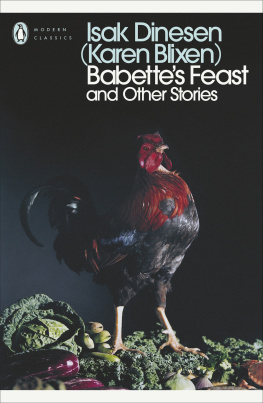

Contents
Isak Dinesen (Karen Blixen)
BABETTES FEAST AND OTHER STORIES

PENGUIN CLASSICS
UK | USA | Canada | Ireland | Australia
India | New Zealand | South Africa
Penguin Classics is part of the Penguin Random House group of companies whose addresses can be found at global.penguinrandomhouse.com.
First published in Great Britain as Anecdotes of Destiny by Michael Joseph 1958
Published in Penguin Books 1986
This edition published as Babettes Feast in Penguin Classics 2013
Copyright Isak Dinesen, 1958
This edition is published with the permission of the Rungstedlund Foundation
Cover photography Claire Sancroft
ISBN: 978-0-241-38799-3

THE BEGINNING
Let the conversation begin
Follow the Penguin Twitter.com@penguinUKbooks
Keep up-to-date with all our stories YouTube.com/penguinbooks
Pin Penguin Books to your Pinterest
Like Penguin Books on Facebook.com/penguinbooks
Listen to Penguin at SoundCloud.com/penguin-books
Find out more about the author and
discover more stories like this at Penguin.co.uk
PENGUIN MODERN CLASSICS
BABETTES FEAST AND OTHER STORIES
Karen Blixen was born in Rungsted, Denmark, in 1885. After studying art at Copenhagen, Paris and Rome, she married her cousin, Baron Bror Blixen-Finecke, in 1914. Together they managed a coffee plantation in Kenya until they divorced in 1925. She continued on the farm until a collapse in the coffee market forced her back to Rungsted in 1931.
Although she had written occasional contributions to Danish periodicals since 1905 (under the nom de plume of Osceola), her real debut took place in 1934 with the publication of Seven Gothic Tales, written in English under the pen name, Isak Dinesen. Out of Africa (1937) is an autobiographical account of the years she spent in Kenya. All of her subsequent books were published in both English and Danish, including Winters Tales (1942) and The Angelic Avengers (1936). Among her other collections of stories are Last Tales (1957), Shadows on the Grass (1960) and posthumously Ehrengard (1963). In the 1950s she was mentioned several times as a candidate to receive the Nobel Prize in Literature.
Baroness Blixen died in Rungsted in 1962. In 1991 her house was opened as The Karen Blixen Museum.

THE DIVER
Mira Jama told this story:
In Shiraz lived a young student of theology by the name of Saufe who was highly gifted and pure of heart. As he read and re-read the Koran he became so absorbed in the thought of the angels that his soul dwelt with them more than with his mother or his brothers, his teachers or fellow-students or any other people of Shiraz.
He repeated to himself the words of the Holy Book: by the angels, who tear forth the souls of men with violence, and by those who draw forth the souls of others with gentleness, by those who glide swimmingly through the air with the commands of God, by those who precede and usher the righteous into Paradise, and by those who subordinately govern the affairs of this world
The throne of God, he thought, will needs be placed so sky-high that the eye of man cannot reach it, and the mind of man reels before it. But the radiant angels move between Gods azure halls and our dark houses and schoolrooms. It should be possible to us to see them and communicate with them.
Birds, he reflected, must be, of all creatures, most like angels. Says not the Scripture: Whatever moveth both in heaven and on earth worshippeth God, and the angels alsoand surely the birds move both in heaven and on earth. Says it not further, of the angels: They are not elated with pride so as to disdain their service, they sing, and perform that which they are commandedand surely the birds do the same. If we endeavor to imitate the birds in all this, we shall become more like the angels than we are now.
But in addition to these things, birds have wings, as have the angels. It would be good if men could make wings for themselves, to lift them into high regions, where dwells a clear and eternal light. A bird, if she strains the capacity of her wings to the utmost, may meet or pass an angel upon one of the wild paths of the ether. Perhaps the wing of the swallow has brushed an angels foot, or the gaze of the eagle, at the moment when her strength was almost exhausted, has met the calm eyes of one of Gods messengers.
I shall, he decided, employ my time and my learning in the task of constructing such wings for my fellow-men.
So he made up his mind that he would leave Shiraz to study the ways of the winged creatures.
Till now he had, by teaching rich mens sons and by copying out ancient manuscripts, supported his mother and his small brothers, and they complained that they would become poor without him. But he argued that, some time, his achievement would compensate them manifold for the privations of the present. His teachers, who had foreseen a fine career for him, came to see him and expostulated with him that, since the world had gone on for so long without men communicating with angels, it must be meant to do so, and might do so in the future as well.
The young Softa respectfully contradicted them.
Until this day, he said, nobody has seen the trekking-birds take their way toward such warmer spheres as do not exist, or the rivers break their course through rocks and plains to run into an ocean which is not to be found. For God does not create a longing or a hope without having a fulfilling reality ready for them. But our longing is our pledge, and blessed are the homesick, for they shall come home. Also, he cried out, carried away by his own course of thought, how much better would not the world of man go, if he could consult with angels and from them learn to understand the pattern of the universe, which they read with ease because they see it from above!
So strong was his faith in his undertaking that in the end his teachers gave up opposing him, and reflected that the fame of their pupil might, in time to come, make them themselves famous with him.
The young Softa now for a whole year stayed with the birds. He made his bed in the long grass of the plain, wherein the quail chirps; he climbed the old trees, in which the ring-dove and the thrush build; found for himself a seat in the foliage and sat so still there that he did not disturb them at all. He wandered in high mountains and, just below the snow-line, neighbored with a pair of eagles, watching them come and go.
He returned to Shiraz with much insight and knowledge gathered, and set himself to work upon his wings.
In the Koran he read: Praise be unto God, who maketh the angels, furnished with two, or three, or four pairs of wings, and resolved to make for himself three pairs, one for his shoulders, one for his waist and one for his feet. During his wanderings he had collected many hundred flight-feathers of eagles, swans and buzzards; he shut himself up with these and worked with such zeal that for a long time he did not see or speak to anyone. But he sang as he worked, and the passers-by stopped and listened, and said: This young Softa praises God and performs that which is commanded.
Next page













